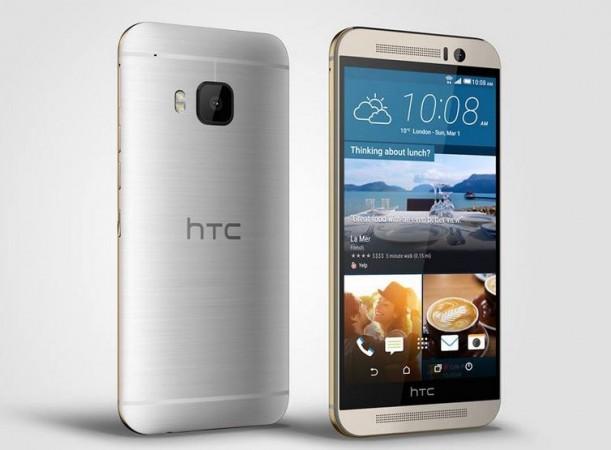
Taiwanese smartphone company HTC is set to officially launch the company's 2015 flagship One (M9) in India on 14 April.
To provide some perspective on the new HTC smartphone, we have listed some of its key aspects based on which users can make an informed buying decision.
Premium build and praise-worthy uni-body design and display:
Few months ago (October 2014 to be precise), UK's prestigious gadget magazine T3 (Tomorrow's Technology Today) rated HTC One (M8) as the best smartphone of 2014, trumping rivals Apple and Samsung. Even HTC One's (M8) predecessor was rated the top smartphone in 2013.
Staying true to the One series' iconic design legacy, HTC has come up with a more evolved and better One M9. It boasts of industry's first dual- tone all-metal body design language, wherein the phone's rear is a silver-coated metal. On the edges, it is laced with gold-coated metal providing dual-metal finish on the outlook.
In terms of display, the new phone sports same 5.0-inch full HD Super LCD 3 screen with pixel density of 440 ppi (pixels per inch) seen in its predecessor.
Many fans might ask why HTC failed to incorporate QHD (2560x1440p), which has become an industry norm for flagship devices since mid-2014. But we would like to remind our readers that full HD and QHD screens we see in the phones are just gimmicks that companies use to market their products.
Many research studies have shown that human eye cannot note difference in pixel density beyond HD (720x1280p) in the small confines of a smartphone screen. Moreover, display with 2K resolution would have been a huge burden on the battery, draining power in no time, if a high-resolution video is played even for short time.
So, HTC One M9 will certainly not disappoint fans while watching videos or seeing photos on the device.
Even control keys layout has also undergone changes in the new One M9.
Earlier models used to have Volume rockers and microSD card slot to the right, a Nano-SIM slot to the left and the power button on top.
In the new HTC One phone, volume-rockers and power switch have been placed on the right side edge with SIM slot on top.
64-bit class SoC (System on Chip):
The third generation HTC One ships with 64-bit class Qualcomm's latest Snapdragon 810 series SoC (System on Chip). It comes with Octa-core chipset housing Quad-core ARM® Cortex™ A57 and quad-core A53 and can clock a staggering 2.7GHz CPU speed.
It is worth noting that Snapdragon 810 is a 64-bit class chipset making HTC One M9 future proof, as most of the Android apps and games developed from this year will use 64-bit source codes. Even the older apps will be upgraded to the new standard.
HTC One M9 is backed by 3GB RAM enough to run power intensive 3D games and do multi-tasking such as running numerous apps at once with less lag.
Camera:
Learning valuable lessons from the past two One M series devices, HTC has incorporated the much- improved 20.0-megapixel camera (with Dual LED flash) inside the One M9. It also boasts of f/2.2 aperture , 27.8mm lens, BSI sensor, digital stabilization and is capable of capturing 4k video.
And on the front, it houses an ultra-pixel technology based (4.1-mp) snapper with wide-angle capture feature, which is certain to cheer selfie aficionados. It also comes packed with BSI sensor with f/2.0 aperture, 26.8mm lens and has the ability to record full HD (1080p) video.
To further enhance the photography, HTC has pre-loaded company's proprietary Eye Experience apps in One M9 with value-added features such as voice-command based selfie taking ability, Live Makeup (photo-editing feature to make changes in face complexion and more), Shape Masking, Photo masking, Prismatic, Double Exposure, Element effects and much more.
[Read More: Android 4.4.4 KitKat with Eye Experience OTA Update Released to HTC One M8]
Battery:
HTC One (M9) houses a high capacity 2840 mAh, which can run the phone up to 21.7 hours of talk-time and close to 402 hours, that's 16 days, under standby mode.
Key specification of HTC One M9 and HTC One M8
| Model | HTC One M9 | HTC One M8 |
| Display |
|
|
| OS | Android 5.0.2 Lollipop with custom UI Sense v7.0 | Android v4.4.2 KitKat OS with HTC Sense v6.0 UI(to get update for next one year) |
| Processor | 64-bit class 2.7GHz Snapdragon 810 series CPU ( Quad-core ARM® Cortex™ A57 and quad-core A53) | Qualcomm Snapdragon 801 series quad-core processor with 2.3GHz CPU speed (some select markets in Asia to be released with 2.5GHz CPU speed) |
| GPU | Adreno 420 | Adreno 330 |
| RAM | 3GB DDR4 | 2GB DDR3 RAM |
| Storage capacity | 32GB,expandable up to 128GB | 16GB/32GB, expandable up to 128GB |
| Camera |
|
|
| Battery | 2840 mAh;
|
2600 mAh (Li-Po, non-removable battery);
|
| Network | 3G & 4G-LTE in select regions | 3G & 4G-LTE Category 4 (50Mbps speed) |
| Add-ons | Nano-SIM slot, Aluminum based body, BoomSound, microSD card slot, Bluetooth v4.1, NFC, Wi-Fi (802.11 a / b / g / n / ac), v5.1 Dolby Surround audio technology, | Metallic body (90-percent)Nano-SIM, Bluetooth v4.0 (with A2DP), Wi-Fi (802.11 a/b/g/n/ac), NFC, microUSB v2.0, MHL, microSD card slot, BoomSound audio system, Infrared blaster, |
| Dimensions | 144.6 x 69.7 x 9.61 mm | 146.4 x 70.6 x 9.4 mm |
| Weight | 157 g | 160 g |









